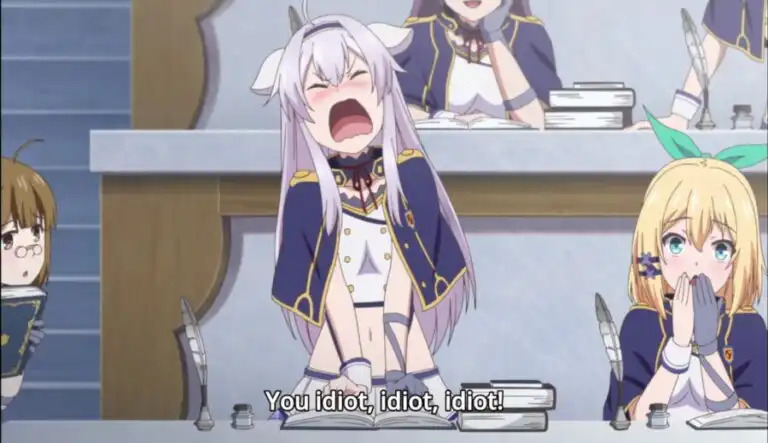Japanese Exclamations

Exclamations are an essential part of manga and anime, and understanding them is crucial for any fan. From conveying emotions to adding emphasis, exclamations can completely change the tone of a scene. By familiarizing yourself with these expressions, you can fully appreciate the nuances of your favorite manga and anime.
Some individuals confuse the terms “cute” and “scary,” leading them to refer to horror films and teddy bears as cute. Here’s a simple method to help you remember which is which. Just keep in mind that Hawaii, home of adorable tropical fish, rhymes with the word “kawaii.” Kowai sounds like the first part of Qui-et, and if there’s a terrible monster approaching, you should keep silent!
- Kawaii = Cute
- Kowai = Scary
- Subarashii = Spectacular
- Saiko = Great
- Kakkoii = Cool
- Kirei = beautiful!
- Oishi = delicious!
- Fuwa fuwa = fluffy!
- Okii = giant!
- Chisai = tiny!
- Ureishii = I’m happy!
- Umi = sea!
- Daisuki = love!
- Suki = like!
- The middle of the words Suki and Daisuki don’t actually have a pronounced U.
- Thus, Suki is simply Ski, just like the sport, rather than Soo-kee. Similarly, Daisuki is pronounced Die-ski rather than Da-ee-soo-kee.
- Moto moto = More and more!
- Zuto zuto! = More and more!
- Kochira! = This way!
- Dekita! = Finished!
- Chotto! = A bit!
- Sore wa! = That’s . . .
- Omoi! = Heavy!
- Kimoi! = Gross!
- Tanoshi! = Fun!
- Megane! = My glasses!
- Chikai! = Too close!
- Chu! = Smooch!
- Unmei! = It’s fate!
- Unmei was used quite often in the anime Night Beyond the Tricornered Window, mostly by Rihito, usually when he was talking about or to Mikado.
- Atsui! = Too hot!
- Suteki! = Nice!
- Utsukushi! = Elegant!
- Ayashii = Suspicious!
The middle of the words Suki and Daisuki don’t actually have a pronounced U. Thus, Suki is simply Ski, just like the sport, rather than Soo-kee. Similarly, Daisuki is pronounced Die-ski rather than Da-ee-soo-kee.
- Moto moto = More and more!
- Zuto zuto! = More and more!
- Kochira! = This way!
- Dekita! = Finished!
- Chotto! = A bit!
- Sore wa! = That’s . . .
- Omoi! = Heavy!
- Kimoi! = Gross!
- Tanoshi! = Fun!
- Megane! = My glasses!
- Chikai! = Too close!
- Chu! = Smooch!
- Unmei! = It’s fate!
Unmei was used quite often in the anime Night Beyond the Tricornered Window, mostly by Rihito, usually when he was talking about or to Mikado.
- Atsui! = Too hot!
- Suteki! = Nice!
- Utsukushi! = Elegant!
- Ayashii = Suspicious!
The Valuable Honorifcs.You would get success and growth through being Formal.
- Itadakimasu = thanks for the food!
- konnichiwa=Japanese greeting that means “hello”, “good afternoon”, or “good day”.
- Ohaiyo = good morning!
- Ja ne = later!
- Sumimasen = excuse me!
- Gomenasai = sorry!
Gomenasai (Go-men-na-sigh) is a slightly more formal way of saying I’m sorry. If an anime character is talking to a close friend/family member or they aren’t really that sorry they might say Gomen Gomen! which is more like My bad!
- Onnegai = please!
- Mo ikai! = One more time!
- Oyasumenasai! = Goon night!
- De wa! = Well then!
- Ano! = Um!
- Demo! = But/Although!
- Ganbatte! = You can do it!
- Youkoso! = Welcome!
- Obeneto! = Congratulations!
- Yokatta! = Thank goodness!
- Irasshai! = Welcome back!

- Hentai = pervert!
- Baka = idiot!
- Onii-san = big brother!
- Aniki = big bro!
- Onne-san! = big sister!
- Annesan = big sister!
- Otosan = dad!
- Okasan = mom!
- Bakemono = monster!
- Uso! = Liar!
- Anata! = You!
- Kami-sama! = My lord!
- Watashi wa! = I . . .!
- Hime sama! = Princess!
- Ouji sama! = Prince!
- Shisho! = Master!
- Hage! = Baldy!
- Ojou-sama=daughter,young lady!
Senpai, a traditional anime exclamation, is frequently used in academic contexts to refer to someone who are more advanced than you are. Senpai, which has a tiny term attached to it that is meant to address people of lower status (Kohai), is strangely seldom used as an exclamation in anime.
Hage can be heard a lot in the first few episodes of The Case Study of Vanitas, as Vanitas taunts Dante.
- Obaba! = Old hag!
- Bancho! = Boss! (usually usde by anime gang members)
- Senpai! = Senior!
Though Yokatta might be pretty common in anime, it can often sound like the anime character is saying Yukata (a light weight Summer kimono) when they are sighing in relief. So be careful of this one!
- Aishiteru! = I love you! (in a non platonic way) So desu! = That’s true/ That’s so
- !
- Muri muri = impossible!
- Muri ja nai! = It’s not impossible
- Ittai = ouch!
- Samui = cold!
- Hayaku = hurry!
- Abunnai = danger!
- Zen zen = never!
- Mi te = look!
- Tabete = eat it!
- Hanase! = Tell me!
- Oki te! = Wake up!
- Wakata = I know!
- Shinde! = Die!
- Matte! = Wait!
- Chotto matte! = Just a moment!
- Tasukute! = Help me!
- Iya da! = Don’t want to!
- Iku denai! = Don’t go!
- Yamate! = Stop!
- Chigai! = You’re wrong!
Chigai (Chee-guy) is sometimes pronounced as Chigao (Chee-gow) but they mean the same thing!
- Urusai! = Shut up!
- Betsuni! = Not really!
- Nani! = What?!
- Naze?! = Why?!
- Daijobu?! = Are you alright?!
- Dochira?! = Which one?!
- Doko?! = Where?!
- Dare?! = Who?!
- Ka?! = Huh?!